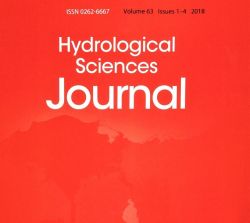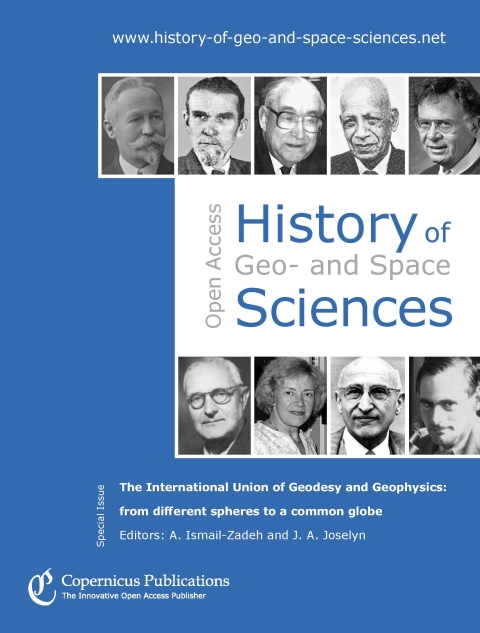IAHS News
Upcoming IAHS sessions at EGU General Assembly 2020
The EGU General Assembly 2020 will be held in the Austria Center Vienna (ACV) in Vienna, Austria, from 3–8 May 2020.
Please be advised that the abstract submission deadline is 15 January 2020, 13:00 CET.
IAHS co-convenes several sessions, including the following ones, especially in line with its agenda-setting initiatives UPH, Panta Rhei, MOXXI, CANDHY and topics of the 10 commissions.
Unsolved Problems in Hydrology Sessions
HS1.2.1 | PICO
Pathways towards solving the Unsolved Problems in Hydrology (UPH)
Co-sponsored by AGU, IAH, and IAHS
Convener: Elena Toth | Co-conveners: Berit Arheimer, Günter Blöschl, Christophe Cudennec, Maria-Helena Ramos
https://meetingorganizer.copernicus.org/EGU2020/session/35358
Panta Rhei Sessions
HS1.2.4 | PICO
Panta Rhei: Hydrology, Society & Environmental Change
Convener: Fuqiang Tian | Co-conveners: Enrica Caporali, Giuliano Di Baldassarre, Heidi Kreibich, Tobias Krueger
https://meetingorganizer.copernicus.org/EGU2020/session/35357
HS7.4
Hydroclimatic change and unchange: exploring the mysteries of variability, nature and human impact
Convener: Serena Ceola | Co-conveners: Christophe Cudennec, Theano Iliopoulou, Harry Lins, Alberto Montanari
https://meetingorganizer.copernicus.org/EGU2020/session/35562
ICSH-STAHY (IAHS) Sessions
HS7.10
Spatial extremes in the hydro- and atmosphere: understanding and modelling
Convener: Manuela Irene Brunner | Co-conveners: A.B. Bardossy, Philippe Naveau, Simon Michael Papalexiou, Elena Volpi
https://meetingorganizer.copernicus.org/EGU2020/session/35560
HS7.7 | PICO
Hydroclimatic and hydrometeorologic stochastics: Extremes, scales, probabilities
Convener: Jose Luis Salinas | Co-conveners: Marco Borga, Auguste Gires, Hannes Müller-Thomy, Alberto Viglione
https://meetingorganizer.copernicus.org/EGU2020/session/35564
HS1.1.1 | Posters only
The MacGyver session for innovative and/or self made tools to observe the geosphere
Convener: Rolf Hut | Co-conveners: Theresa Blume, Elisa Coraggio, Flavia Tauro, Andrew Wickert
https://meetingorganizer.copernicus.org/EGU2020/session/35359
CandHy session
HS3.2 | PICO
Innovative sensing techniques for water monitoring, modelling, and management: Satellites, gauges and citizens
Convener: Fernando Nardi | Co-conveners: Thaine H. Assumpção, Wouter Buytaert, Serena Ceola, Maurizio Mazzoleni
https://meetingorganizer.copernicus.org/EGU2020/session/35467
Further IAHS related sessions
HS2.4.5
Long-term catchment memory
Convener: Vazken Andréassian | Co-conveners: Berit Arheimer, Alban de Lavenne, Markus Hrachowitz, Amaury Tilmant
https://meetingorganizer.copernicus.org/EGU2020/session/35639
HS5.2.1
Advances in Socio-Hydrology
Convener: Britta Höllermann | Co-conveners: Iolanda Borzì, Giuliano Di Baldassarre, Murugesu Sivapalan, Ted Veldkamp
https://meetingorganizer.copernicus.org/EGU2020/session/35484
HS5.2.2
Socio-hydrological approach to understand conflict and cooperation dynamics in transboundary rivers
Convener: Jing Wei | Co-conveners: Mohammad Ghoreishi, Murugesu Sivapalan, Fuqiang Tian
https://meetingorganizer.copernicus.org/EGU2020/session/35485
HS2.4.3
Space-time dynamics of floods: processes, controls, and risk
Convener: William Farmer | Co-conveners: Heidi Kreibich, Luis Mediero, Alberto Viglione, Sergiy Vorogushyn
https://meetingorganizer.copernicus.org/EGU2020/session/35540
HS2.5.2 | PICO
Large-sample hydrology: characterising and understanding hydrological diversity
Convener: Sandra Pool | Co-conveners: Gemma Coxon, Wouter Knoben, Nicolas Vasquez, Keirnan Fowler
https://meetingorganizer.copernicus.org/EGU2020/session/35535
Subscription for Hydrological Sciences Journal for 2020
The annual subscription is now due for Volume 65 (2020) of Hydrological Sciences Journal. Volume 65 remains at 16 issues but we are pleased to announce that the annual subscription rate remains the same. The Impact Factor of HSJ is 2.180 with a 5-year Impact Factor of 2.510 (©2019 Clarivate Analytics, 2018 Journal Citation Reports®).
The HSJ Editorial Board currently consists of Editor-in-chief Attilio Castellarin, and Co-editors Stacey Archfield and Aldo Fiori, supported by 41 Associate Editors. Details may be found at https://iahs.info/Publications-News/Hydrological-Sciences-Journal.do
Lists of Tison Award winning articles and Featured Articles – selected by the editors as meriting special attention – are free to view.
Volume 65 will continue to publish a special series of invited opinion papers directly linked to the IAHS "Panta Rhei" initiative that are collated in the online virtual special series. Link Discussions and replies on these opinion papers will also be published.
A special issue of Hydrological Sciences Journal is in progress:
· Hydrological Data: Opportunities and barriers; Guest editors: C. Cudennec, B. Arheimer, H. Lins, and S. Uhlenbrook.
Membership Subscription
Special journal subscription rates are available to IAHS Members: £27.00 for a personal online subscription, and £48.00 for a personal online + print subscription (£32.40 and £53.40, respectively for EU members, inclusive of VAT).
You can renew your membership online via the IAHS website at https://iahs.info/Members-Area/hsj-link.do or contact the IAHS office via phone +44 1491 692515 or email [email protected].
IAHS Membership
International Hydrology Prize – Call for nominations before 31st December 2019
Nominations for the Prize are made by National Committees to IAHS, National Committees to the UNESCO-IHP or National Hydrological Advisors to the WMO, and forwarded to the Secretary General of IAHS for consideration by the Nomination Committee. The Committee consists of the President and a Vice-President of IAHS, as well as representatives from UNESCO and WMO.
Two medals are awarded under the International Hydrology Prize: the Dooge medal and the Volker medal. Both medals are intended to distinguish outstanding achievements by hydrological scientists but with a different focus. The Dooge medal is aimed at fundamental contributions to the science of hydrology, whereas the Volker medal is aimed at outstanding applications of hydrological science for the benefit of society at large.
The following applies to both the Dooge and Volker medals:
- The International Hydrology Prize shall be awarded to persons who have made outstanding contributions to hydrology such as confers on the candidate universal recognition of his or her international stature.
- The contribution should have an identifiable international dimension extending beyond both the country of normal work and the specific field of interest of the candidate.
- The medals may be awarded to hydrologists of long international standing or to younger but active hydrologists who exhibit qualities of international leadership in the science or practice of hydrology.
- An active involvement in the work of IAHS and other international organisations in the field of hydrology should be counted as an advantage.
Specific considerations for the Dooge medal:
- The Dooge medal is particularly intended for hydrologists who have demonstrated scientific excellence, and have made fundamental contributions to the science of hydrology as evidenced by publications in the international scientific literature and other evidence of high standard.
- Preference should be given to candidates who have recently exhibited outstanding international leadership in the science of hydrology.
Specific considerations for the Volker medal:
- The Volker medal is dedicated for hydrologists who have applied their research and hydrological expertise to the benefit of society, addressing issues of public interest and development.
- Applications of hydrology to the benefit of developing countries would count as an advantage.
- Preference should be given to candidates who have contributed through both scientific and practical work, and who have made outstanding contributions to the Hydrology community as demonstrated by active involvement in the work of IAHS or other international hydrological associations.
Nomination format and procedure
Nominations should be received by the Secretary General of IAHS no later than 31 December 2019 – Christophe Cudennec at [email protected] – and consist of:
- a (max. 2, pages A4 format) nomination letter signed by a National Representative to IAHS, the President of a national committee of UNESCO-IHP, or a National Hydrological Advisor to the WMO, with one sentence citation (max. 200 characters), and stating why the nominee is the most qualified person to receive the Volker or Dooge medal, paying attention to the medal's dedication specified above;
- the nominee’s CV (max. 3 pages, A4 format) with an emphasis on the contribution to hydrological science and international scientific cooperation, providing clear information on the main criteria used for the evaluation and the specific considerations mentioned above.
- a list of the major scientific publications (max. 2 pages, A4 format).
Nominations are expected from the world diversity, and equally for female and male candidates.
Evaluation criteria
a) Outstanding contributions to hydrology evidenced by universal recognition of his or her international stature.
b) Identifiable contributions with international dimensions extending beyond both the country of normal work and the specific field of interest of the candidate.
c) For senior candidates prove of Hydrologists activities of long international standing, or for younger candidates, prove of being active hydrologists with qualities of international leadership in the science or practice of hydrology.
d) Active involvement in the work of IAHS and other international organizations in the field of hydrology is counted as an advantage.
e) Application of the hydrological research performed and the use of his/her expertise to the benefit of society and addressing issues of public interest and development.
f) Applications of hydrology to the benefit of developing countries counts as an advantage.
4th International Conference on the Hydrology of Large African Rivers
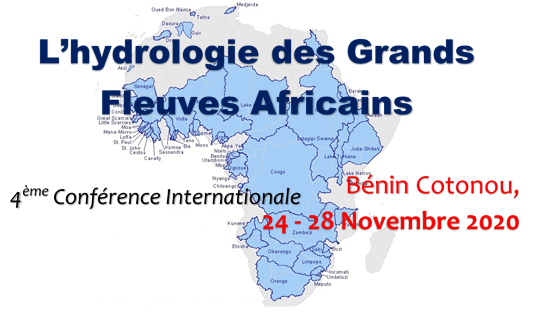 The 4th International Conference on "The Hydrology of Large African Rivers" will be held in Cotonou, Republic of Benin from 24 to 28th November 2020.
The 4th International Conference on "The Hydrology of Large African Rivers" will be held in Cotonou, Republic of Benin from 24 to 28th November 2020. The conference is organized in the frame of the UNESCO-IHP FRIEND-Water program, with the support of IAHS.
Full details of the conference are available on the website: https://friendgrandsfleuvesafriquecotonou2020.org/
Please register and submit your abstract through: https://friendgrandsfleuvesafriquecotonou2020.org/submission/.
Alongside the scientific sessions there are also several training sessions planned including 'the use of satellite data in hydrology' at discount prices for participants to the conference. Registration fees will be displayed on the website soon.
Selected presentations from the conference will be included in a PIAHS volume (indexed WOS and Scopus).
You can also follow the conference news on ResearchGate:
https://www.researchgate.net/project/4th-FRIEND-IAHS-International-Conference-on-the-Hydrology-of-African-Large-river-Basins
Gil Mahe FRIEND FIGCC Chair
Ernest Amoussou FRIEND AOC coordinator and main organizer
Applications invited for 2020 Sivapalan Young Scientists Travel Awards
Applications are invited for the IAHS SYSTA (SIVAPALAN YOUNG SCIENTISTS TRAVEL AWARDS) towards the costs of participating at the following IAHS-badged conferences in 2020:
- “River sediment quality and quantity: environmental, geochemical and ecological perspectives” ICCE – Bydgoszcz, Poland – 1-5 June
- “9th International Water Resources Management Conference of ICWRS” ICWRS – Cairns, Australia – 20-22 July
- STAHY 2020 – Valencia, Spain – 23-25 September
- “Hydrology of the Major African Basins” – Cotonou, Benin – 24-28 November
Full details of the SYSTA eligibility criteria and application procedure are at: https://iahs.info/About-IAHS/SYSTA.do
The three key criteria are that applicants should be from, and currently reside in, a financially disadvantaged country, be within 5 years of their PhD award and be first author of a paper in Hydrological Sciences Journal (HSJ) or Proceedings of the International Association of Hydrological Sciences (PIAHS) or in another listed hydrological journal. Those who have previously received a SYSTA award for intercontinental travel are not eligible to apply. The maximum award value is 2000 euros.
The closing date for SYSTA applications for 2020 meetings is 20 January 2020.
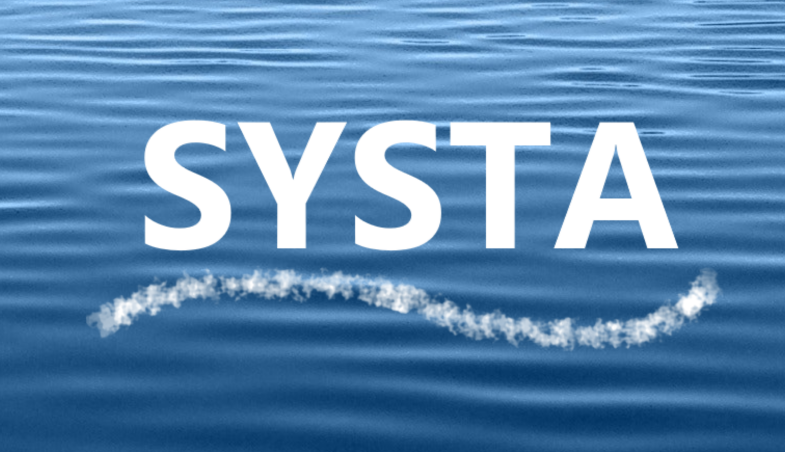
Invitation to the 2020 IAHS/ICCE International Symposium
We would like to invite you to the IAHS/ICCE International Symposium 'River sediment quality and quantity: environmental, geochemical and ecological perspectives'.
The IAHS event will be held in Bydgoszcz, Poland on June 1-5, 2020 (www.icce2020.ukw.edu.pl)
Topics of interest for submission include, but are not limited to:
Sediment quantity – cascades, budgets, yields
Sediment impacts on river channel hydromorphology and management
Sediment quality – geochemistry, nutrients, contaminants, emerging issues
Sediment-biota interactions
Business Day - inland waterways development in Middle-East Europe
Registration is open (click here)
Abstract submission deadline: Februrary 1, 2020
This event is eligible for IAHS SYSTA travel support.
Publication:
All participant’s of ICCE 2020 will be able to submit papers to peer-reviewed scientific journals. Four of five journals are indexed on Web of Science (Core Collection) and Scopus. The papers will be reviewed according to requirements of the selected journals.
https://www.geographiapolonica.pl
http://www.aucgeographica.cz
https://ges.rgo.ru/jour
http://acta.urk.edu.pl
http://www.geography.and.tourism.ukw.edu.pl/
Contact email: [email protected]
Website, Registration and Submission: www.icce2020.ukw.edu.pl
We look forward to welcoming you next June in Bydgoszcz !
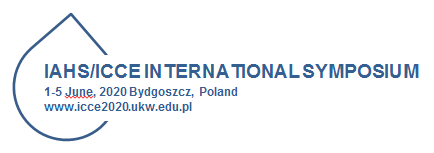
'Land use and climate change impacts on erosion and sediment transport' PIAHS Volume 381 now available
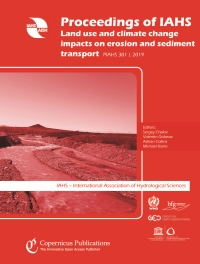
The papers were part of a joint symposium combining The Second International Young Scientists Forum on Soil and Water Conservation (WASWAC) and the International Commission on Continental Erosion (ICCE-IAHS) which was held on 27–31 August 2018, in Moscow. Contributions were invited on work that investigates fluvial processes including hillslope and gully erosion and sediment transport, as well as river channel changes and management, the influence of hydro-sedimentological processes operating at local to global scales, and those that compare the findings drawn from local and global studies. A particular focus of the papers in this new volume is to provide regional examples of sediment movement along the sediment cascade in Northern Eurasia. Most of these works report scientific studies across a territory which covers nearly one sixth of the land surface of the Earth. Publication in a PIAHS volume permits wider dissemination of these regional studies. Collectively, the papers cover studies from the East European plain, Kola Peninsula Mountains, Central Siberian Plateau, and the Kamchatka peninsula, as well as river catchments in Japan and Italy.
This PIAHS volume continues the long-term tradition of stand-alone proceedings from meetings convened by the International Commission on Continental Erosion (ICCE-IAHS). Since 1981, ICCE has arranged a sequence of conferences and published 36 proceedings – and this volume discusses the ICCE story through a detailed scientometric analysis of past ICCE activities (Bondarev).
The first part of this volume comprises regional studies of soil and gully erosion (Sharifullin et al.; Gafurov et al.; Garankina et al.). The section also includes examples of an integrated approach to the study of sediment origin (Chalov et al.).
The second part of the volume is devoted to river process and connections with sediment transport issues. It includes novel studies of sediment yield presented by case studies from Italy (Porto and Callegari), the Kamchatka peninsula (Kuksina), Caucuses mountains (Tsyplenkov et al.) and channel erosion research (Golovlyov et al.; Fingert et al.; Kuznetsova et al.).
The third part of the volume links sediment transport processes and lake sedimentation, as well as environmental impacts. It mostly includes studies on the reconstruction of the long-term dynamics of sedimentation (Konoplev et al.; Wakiyama et al.; Garankina et al.), but also focuses on river runoff processes and salmon migration (Moreydo).
100 Years of IUGG
The International Union of Geodesy and Geophysics (IUGG) was established on 28 July 1919 in Brussels, Belgium at the Inaugural General Assembly of the International Research Council (now the International Science Council) to promote activities of already-existing international scientific societies dealing with geodesy, terrestrial magnetism and electricity, meteorology, physical oceanography, seismology, and volcanology.
To celebrate the centenary of IUGG a special issue was compiled in the open-access journal History of Geo- and Space Sciences.
The International Union of Geodesy and Geophysics: from different spheres to a common globe (https://www.hist-geo-space-sci.net/special_issue996.html)
Editor(s): A. Ismail-Zadeh and J. A. Joselyn
The special issue (SI) is comprised of 11 articles describing the history of the International Union of Geodesy and Geophysics (IUGG) and its eight International Associations. The SI is dedicated to the centennial anniversary of the Union, which has been coordinating and promoting international efforts in Earth and space sciences since 1919.
The purpose of this SI is not to relay a definitive history of the development of international cooperation in geosciences, but to summarize IUGG's remarkable role during the 100-year span of its existence. The first three articles present the history of IUGG from its founding through the years of extraordinary development of geophysical sciences and the concurrent evolution of the Union's structure and programs extending up to its advances at the beginning of the 21st century. Outstanding histories of each of the IUGG Associations are then presented.
Two articles are of special relevance to IAHS:
IAHS: a brief history of hydrology
Dan Rosbjerg and John Rodda
Hist. Geo Space. Sci., 10, 109-118, https://doi.org/10.5194/hgss-10-109-2019, 2019
Short summary
After describing the hydrological cycle and defining hydrology in the introduction, the early historical development of hydrology is briefly presented. Then the incorporation of hydrology within the IUGG and the subsequent development of the association are described chronologically. Finally, in the conclusions, the present state of the association is discussed together with an outlook for the future.
And
IACS: past, present, and future of the International Association of Cryospheric Sciences
Ian Allison, Charles Fierz, Regine Hock, Andrew Mackintosh, Georg Kaser, and Samuel U. Nussbaumer
Hist. Geo Space. Sci., 10, 97-107, https://doi.org/10.5194/hgss-10-97-2019, 2019
Short summary
The International Association of Cryospheric Sciences (IACS) became the eighth and most recent association of IUGG in July 2007. IACS was launched in recognition of the importance of the cryosphere, particularly at a time of significant global change. The forbears of IACS, however, start with the 1894 Commission Internationale des Glaciers (CIG). This paper traces the transition from CIG to IACS; scientific objectives that drove activities and changes, and key events and individuals involved.
More information on the history of IAHS can be found at https://iahs.info/About-IAHS/History-of-IAHS.do
2019 International Hydrology Prize medalists and Tison award ceremony
Congratulations to the recipients of the International Hydrology Prize (Dooge medal and Volker medal) and Tison award for 2019!
The International Hydrology Prize is awarded annually by IAHS, with UNESCO and WMO, to two people who have made an outstanding contribution to hydrological science. The 2019 IHP medals were awarded during the 27th IUGG General Assembly in Montreal, Canada as follows:
Dooge medal - Alberto Montanari, at the Department of Civil, Chemical, Environmental and Material Engineering, University of Bologna, Italy 'For pioneering contributions to understanding hydrological systems in the presence of environmental and climatic change.'
For the full citation and response see the IAHS webpage https://iahs.info/About-IAHS/Competition--Events/International-Hydrology-Prize/International-Hydrology-Prize-Winners/A-Montanari.do
Volker medal - Jan Szolgay, at the Slovak Technical University, Faculty of Civil Engineering, Department of Land and Water Resources Management, Slovakia 'In recognition of his international leadership in engineering hydrological research for the benefit of society.'
For the full citation and response see the IAHS webpage https://iahs.info/About-IAHS/Competition--Events/International-Hydrology-Prize/International-Hydrology-Prize-Winners/J-Szolgay.do
The 2019 Tison Award was presented to Sandra Pool (Switzerland) and Marc Vis (The Netherlands) for the paper:
Sandra Pool, Marc Vis & Jan Seibert (2018) Evaluating model performance: towards a non-parametric variant of the Kling-Gupta efficiency, Hydrological Sciences Journal,
63:13-14, 1941-1953, DOI: 10.1080/02626667.2018.1552002
The IAHS Tison Award, established in 1982, aims to promote excellence in research by young hydrologists. The Award is granted for an outstanding paper published by IAHS in a period of two years previous to the deadline for nominations.
For the full citation and response see the IAHS web page: https://iahs.info/About-IAHS/Competition--Events/Tison-Award/Tison-Award-winners/S-Pool--M-Vis/
The paper is available free to view.
Results from the IAHS Officer elections from the Administrative Plenary
| Position | Candidates | Nationality / Residence | |
| IAHS | President | Günter Blöschl | Austria |
| President-Elect | Berit Arheimer | Sweden | |
| VP | Salvatore Grimaldi | Italy | |
| VP | Paola Passalacqua | Italy / USA | |
| VP | Zongxue Xu | China | |
| Secretary General | Christophe Cudennec | France | |
| ICCE | President | Adrian Collins | UK |
| President-Elect | Paolo Porto | Italy | |
| VP | Yuri da Silva | Brazil | |
| VP | Xudong Fu | China | |
| VP | Allen Gellis | USA | |
| Secretary | Sergey Chalov | Russia | |
| ICCLAS | President | Harald Kunstmann | Germany |
| President-Elect | Richard Petrone | Canada | |
| VP | Monica Garcia | Spain / USA | |
| VP | Kanishka Mallick | India / Luxembourg | |
| VP | Fuqiang Tian | China | |
| Secretary | Christopher White | UK | |
| ICGW | President | Aldo Fiori | Italy |
| President-Elect | Felipe de Barros | Brazil / USA | |
| VP | Roseanna Neupauer | USA | |
| VP | Daniele Pedretti | Italy / Finland | |
| VP | Alraune Zech | Germany | |
| Secretary | Antonio Zarlenga | Italy | |
| ICRS | President | Yangbo Chen | China |
| President-Elect | Amir AghaKouchak | Iran / USA | |
| VP | Yaning Chen | China | |
| VP | Chris Hopkinson | Canada | |
| VP | Maria Jose Polo Gomez | Spain | |
| Secretary | Gilles Boulet | France | |
| ICSH | President | Ashish Sharma | Australia |
| President-Elect | Elena Volpi | Italy | |
| VP | Yuanfang Chen | China | |
| VP | Svenja Fischer | Germany | |
| VP | Chris Kochanek | Poland | |
| Secretary | Ilaria Prosdocimi | Italy / Belgium | |
| ICSIH | President | Tobias Jonas | Switzerland |
| President-Elect | Melody Sandells | UK | |
| VP | Tim Link | USA | |
| VP | James McPhee | USA / Chile | |
| VP | McKenzie Skiles | USA | |
| Secretary | Vsevolod Moreydo | Russia | |
| ICSW | President | Gil Mahé | France |
| President-Elect | David Hannah | UK | |
| VP | Ernest Amoussou | Bénin | |
| VP | Alain Dezetter | France | |
| VP | Guoqin Wang | China | |
| Secretary | Yonca Cavus | Turkey | |
| ICT | President | Christine Stumpp | Austria |
| President-Elect | Zhonghe Pang | China | |
| VP | Søren Jessen | Denmark | |
| VP | Maki Tsujimura | Japan | |
| VP | Tricia Stadnyk | Canada | |
| Secretary | Przemyslaw Wachniew | Poland | |
| ICWQ | President | Wouter Buytaert | UK |
| Co-President-Elect | Xiaohong Chen | China | |
| Co-President-Elect | Elango Lakshmanan | India | |
| VP | Alena Bartosova | Czech Rep. / Sweden | |
| VP | Stefan Krause | Germany / UK | |
| VP | Hongyi Li | China / USA | |
| Secretary | Geneviève Ali | Canada | |
| ICWRS | President | Andreas Schumann | Germany |
| President-Elect | Barry Croke | Australia | |
| VP | Jennifer Adam | USA | |
| VP | Jean-Marie Kileshye | Congo / Zimbabwe | |
| VP | Marloes Mul | Netherlands | |
| Secretary | Alberto Viglione | Italy |
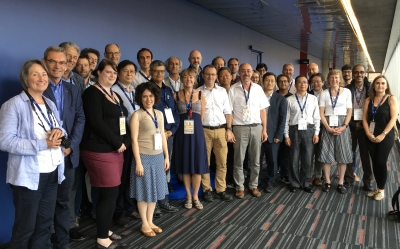 First meeting of the new bureau on Sunday 14th July 2019.
First meeting of the new bureau on Sunday 14th July 2019.
